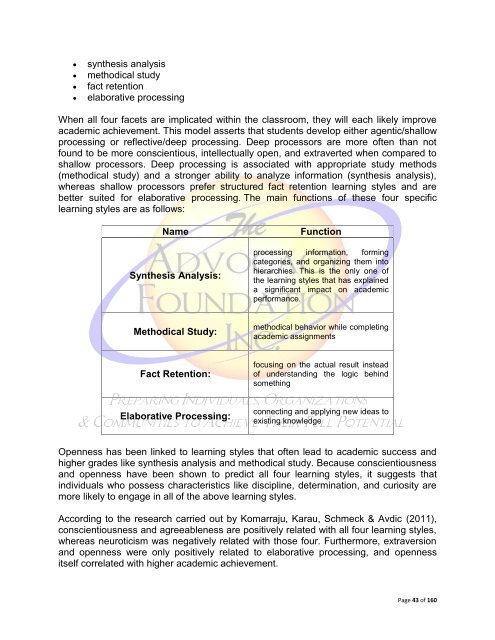The Gift of Introversion
The Gift of Introversion
The Gift of Introversion
Create successful ePaper yourself
Turn your PDF publications into a flip-book with our unique Google optimized e-Paper software.
synthesis analysis<br />
methodical study<br />
fact retention<br />
elaborative processing<br />
When all four facets are implicated within the classroom, they will each likely improve<br />
academic achievement. This model asserts that students develop either agentic/shallow<br />
processing or reflective/deep processing. Deep processors are more <strong>of</strong>ten than not<br />
found to be more conscientious, intellectually open, and extraverted when compared to<br />
shallow processors. Deep processing is associated with appropriate study methods<br />
(methodical study) and a stronger ability to analyze information (synthesis analysis),<br />
whereas shallow processors prefer structured fact retention learning styles and are<br />
better suited for elaborative processing. <strong>The</strong> main functions <strong>of</strong> these four specific<br />
learning styles are as follows:<br />
Name<br />
Synthesis Analysis:<br />
Function<br />
processing information, forming<br />
categories, and organizing them into<br />
hierarchies. This is the only one <strong>of</strong><br />
the learning styles that has explained<br />
a significant impact on academic<br />
performance.<br />
Methodical Study:<br />
methodical behavior while completing<br />
academic assignments<br />
Fact Retention:<br />
focusing on the actual result instead<br />
<strong>of</strong> understanding the logic behind<br />
something<br />
Elaborative Processing:<br />
connecting and applying new ideas to<br />
existing knowledge<br />
Openness has been linked to learning styles that <strong>of</strong>ten lead to academic success and<br />
higher grades like synthesis analysis and methodical study. Because conscientiousness<br />
and openness have been shown to predict all four learning styles, it suggests that<br />
individuals who possess characteristics like discipline, determination, and curiosity are<br />
more likely to engage in all <strong>of</strong> the above learning styles.<br />
According to the research carried out by Komarraju, Karau, Schmeck & Avdic (2011),<br />
conscientiousness and agreeableness are positively related with all four learning styles,<br />
whereas neuroticism was negatively related with those four. Furthermore, extraversion<br />
and openness were only positively related to elaborative processing, and openness<br />
itself correlated with higher academic achievement.<br />
Page 43 <strong>of</strong> 160

















